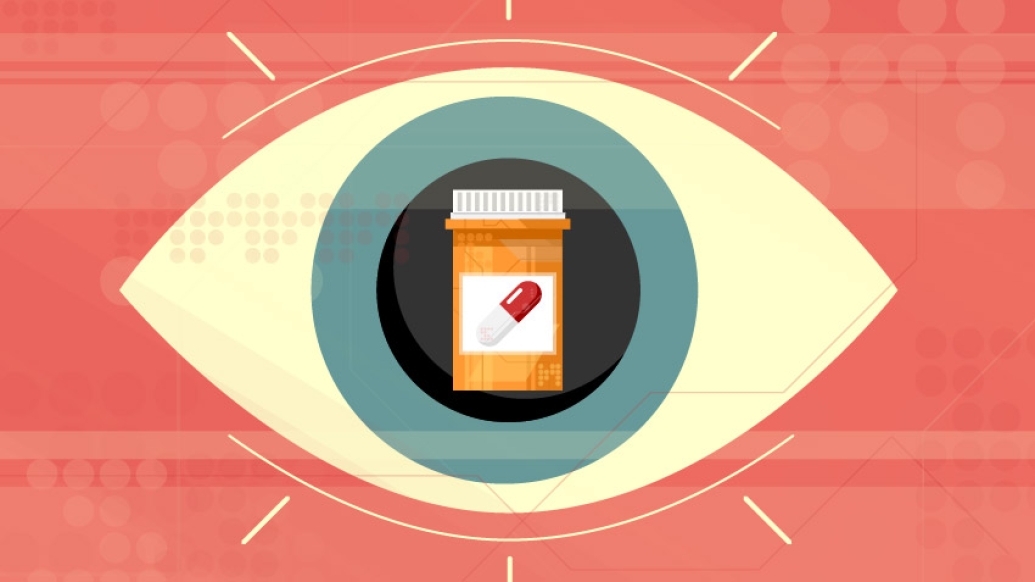Patients used fewer opioid tablets when surgeons cut back prescriptions, but there is more work to be done on safe medication disposal.
12:00 PM
Author |

Eye doctors at the University of Michigan Kellogg Eye Center developed a plan to help curb the nation's opioid epidemic – starting at their own clinic.
The approach: Doctors in the cornea clinic would give patients fewer pills after surgery – the time when many people are first introduced to opioid medications. They would also talk to patients about the proper use of opioids and the associated risks.
MORE FROM MICHIGAN: Subscribe to our weekly newsletter
The interventions showed fewer opioids could be prescribed without compromising pain control after surgeries such as cornea transplants and vision-correcting surgeries.
"Two recent policy changes – one by our institution, and one by our state – combined to create this new opportunity to learn about post-operative opioid consumption," says Maria Woodward, M.D., M.S., cornea chief at Kellogg Eye Center and health services researcher at the U-M Institute for Healthcare Policy and Innovation. "First the cornea division at Kellogg changed policy, decreasing the number of opioid tablets we prescribe. Second, the state of Michigan instituted a mandatory prescription monitoring program."
We were very encouraged to see that even a dramatic reduction in the number of opioid pills prescribed had no negative impact on pain control.Maria Woodward, M.D., M.S.
For a study published in JAMA Ophthalmology, a Kellogg team assessed the impact on limiting opioid prescriptions after corneal procedures, like penetrating keratoplasty, collagen cross-linking, superficial keratectomy and photorefractive keratectomy, which is a vision-correcting surgery to reshape cornea tissue that's a predecessor to the LASIK procedure.
SEE ALSO: Corneal Crosslinking Helps Maintain Sight with Corneal Disease
Notably, the cornea is known for having more nerve endings than any other part of the body, making pain management a common part of post-operative recovery.
But exposure to opioids during procedural care can lead to long-term use. Physicians, led by study author Jennifer Waljee, M.D., M.P.H., co-director of Michigan-OPEN, are looking for a middle ground.
Prescribing patterns predictor of opioid use
The Kellogg study team identified 82 patients who underwent cornea surgery and surveyed them post-surgery about how many pills they actually used, what pain they experienced after surgery, and what they did with any leftover pills.
Before the clinic policy change, the average prescription for cornea surgery was 18.8 pills. When researchers interviewed patients, the amount of opioid medication they'd actually taken after the operation was eight.
The rest was often still left at home, or carried around with them.
After the policy change, the average prescription for cornea surgery dropped to 6.6 pills and patients reported using just four.
SEE ALSO: Patients Use Only a Fraction of Opioids Given After Surgery
Within the group receiving the lower pill count, 84% of patients reported that the prescription was adequate to control their moderate to severe pain and 22% reported receiving more pills than they needed. Only 7% felt they received less medication than needed for pain control.
The study findings suggest eye doctors may be prescribing more opioids than patients need after corneal surgical procedures.
"We were very encouraged to see that even a dramatic reduction in the number of opioid pills prescribed had no negative impact on pain control," says Woodward, the lead study author who is also an assistant professor of Ophthalmology and Visual Sciences at the University of Michigan.
The patient interviews reveal there's more work to be done to keep leftover opioid pills out of harm's way. In the study, none of the patients discarded of pills as recommended by taking them to a health center or police station for disposal.
"This study shows we're making progress in the battle against opioid misuse," Woodward says. "But we can do more to make sure that everyone knows how to prescribe them, use them and dispose of them safely."
Paper cited: "Association of Limiting Opioid Prescriptions with Use of Opioids After Corneal Surgery," JAMA Ophthalmology. DOI: 10.1001/jamaophthalmol.2019.4432

Explore a variety of healthcare news & stories by visiting the Health Lab home page for more articles.

Department of Communication at Michigan Medicine
Want top health & research news weekly? Sign up for Health Lab’s newsletters today!





